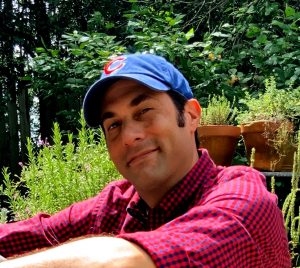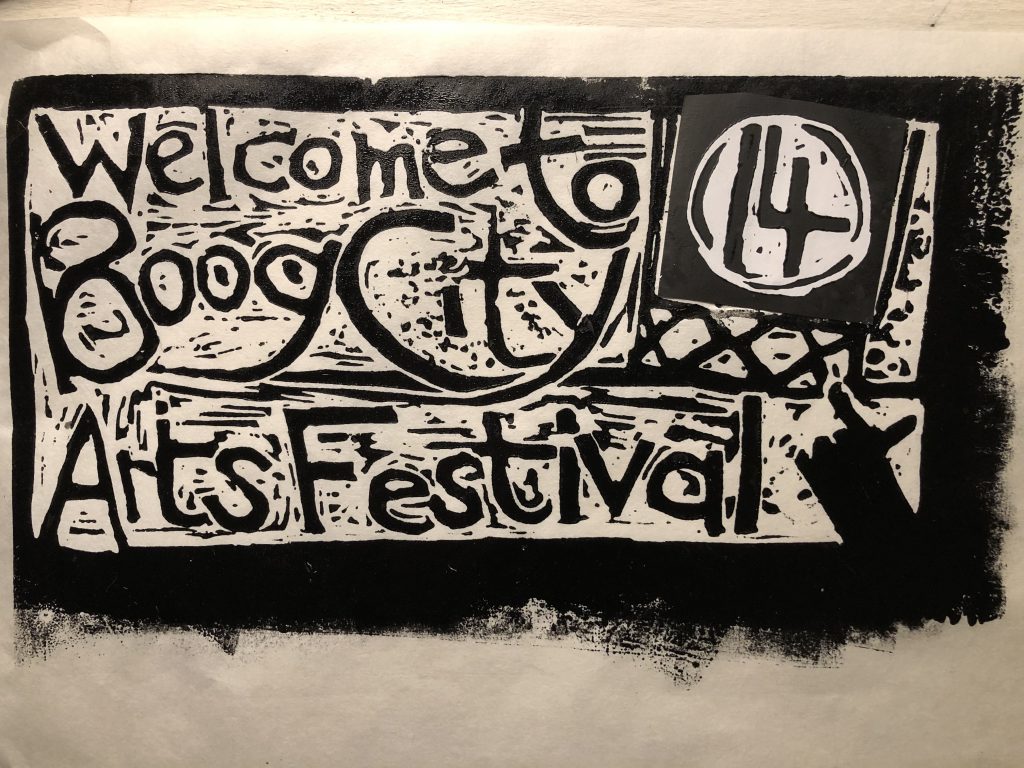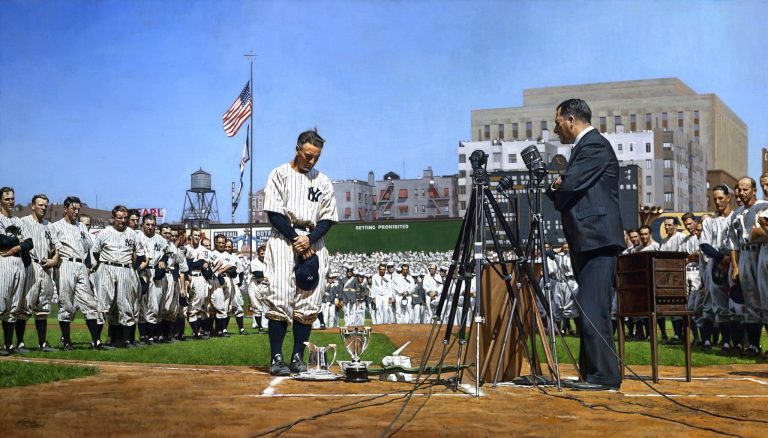Boog City 137: The Baseball Issue
By Jared Wyllys
I loved playing Little League baseball as a kid, but I was always a terrible hitter. The league I played in when I was very young in Marine City, Mich., transitioned us from hitting off of tees to hitting off of a pitching machine before eventually facing our peers as pitchers by the time I was about 10. The pitching machine was an easy transition because it was mostly predictable. The ball was going somewhere in the strike zone no matter what, but in my first season against live pitchers, I was faced with the unpredictability of a fellow elementary-aged kid pitching to me.
I survived the first year by mostly trying to draw walks, but the summer after I turned 10, we moved to a different town, which meant I was in a brand-new league the next year. In my first game that season, I took a pitch to the center of my back in my first at-bat, walked the next, and then got beaned again my next time up.
Not much else about that season I remember other than that I was ruined as a hitter. Every at-bat, I was thinking about not getting hit. I started stepping away from the plate with my front foot as soon as the pitch was released, and then when I did swing, it was practically hopeless. My coach tried adjusting my stance to adapt to what I was doing, but it didn’t work. I kept bailing out.
Every at-bat, I was thinking about not getting hit.
I think I lasted one more year, but I stopped playing by the time I was going into 7th grade. Baseball is my favorite sport to this day, but fear of getting hit by a pitch drove me away from playing it.
Though I got hit twice in my first game, I don’t think I ever did again that season or the next. In truth, the best thing for me would have been to get hit again. And again. And again. And again until I eventually would have realized that it wasn’t that big of a deal.
Last spring, my oldest son played his first season in kids-pitch Little League, and sure enough, in one of his first games, he got hit by a pitch. And then like watching my old self, he started bailing out at the plate on nearly every pitch.
I tried encouraging him to stay in the batter’s box and just keep trying, but that didn’t help. You can tell someone not to be afraid of something, but they have to experience and realize that themselves.
Eventually, I decided to get the advice of someone who has dealt with a lot of getting plunked. In his nine-year career, Anthony Rizzo has been hit by a pitch 145 times. He led all of baseball in 2015, 2017, and last year. But despite this, he still stands in close to the plate.
“I’m on top of the plate, so when I get hit, I get hit,” Rizzo told me last June. “It’s just part of it. I don’t think it’s ever really changed my approach at all. I never really minded getting hit by a ball. Obviously, if I did, I’d be way off the plate. It’s just part of it.”
For the woman in the poem, the best way to get the work done was to get it done.
Most anything we do includes some element of risk, especially if we’re doing it right. Being a good hitter means embracing the possibility of getting hit. It’s going to happen and working to avoid it only causes other problems. I never overcame my fear because I only worked to avoid getting hit.
In his second book of poetry, North of Boston, Robert Frost is probably best known for “Mending Wall” but there’s also a poem in that collection called “A Servant to Servants” that tells the story of a woman tired of working every day to take care of her husband and his workers and the loneliness and frustration that results.
There’s a pile of work to be done every day, and she’s tired of it. In the poem, she meets a visitor and vents these feelings, and about a third of the way into the poem, she shares some advice she got from her husband, “The best way out is always through.”
She begrudgingly agrees, but I think that’s how most things are. My wife and I hung that quote in our house while we were going through the foster-to-adopt process because it was a helpful daily reminder.
For the woman in the poem, the best way to get the work done was to get it done. For us, the best way out was to go through the process one day at a time, even as it took years. For the woman in the poem, the best way to get the work done was to get it done. In book five of his Meditations, Marcus Aurelius said, “The impediment to action advances action. What stands in the way becomes the way.”
For my son, it meant this spring we’ve spent time in the yard, me pitching to him over and over until one day he proudly announced that he wasn’t afraid of getting hit by a pitch anymore. The best way out was through.
 JARED WYLLYS is a writer who has covered baseball for Sporting News, Forbes Sports, Chicago Magazine, NBC Chicago, and Baseball Prospectus. He joined the BBWAA in 2019. Wyllys lives with his wife and four children in Chicago’s western suburbs, where he teaches high school English. He can be found on Twitter (@jwyllys) or via email (jwyllys7@gmail.com).
JARED WYLLYS is a writer who has covered baseball for Sporting News, Forbes Sports, Chicago Magazine, NBC Chicago, and Baseball Prospectus. He joined the BBWAA in 2019. Wyllys lives with his wife and four children in Chicago’s western suburbs, where he teaches high school English. He can be found on Twitter (@jwyllys) or via email (jwyllys7@gmail.com).
by Holly M. Wendt
You learned a long time ago that every touch is an accident, though your mouth is closer every night to this stranger’s neck and then another stranger’s neck for longer than it takes a film to unspool in the dark…
In umpire school, learn balance. Come into half-crouch, anchor palms to knees, railroad spiked and level, but learn lightness. Learn to read the ball past calling it, learn to know when to spin away. Take a bad hop to the crotch all the same. The catcher will rest a hand—bare or double-weighted in leather—on the hunch of your shoulder. When it happens to him, you will step aside for the trainer. You learned a long time ago that every touch is an accident, though your mouth is closer every night to this stranger’s neck and then another stranger’s neck for longer than it takes a film to unspool in the dark, though you are both sweat-dark front and back and cursing August, Arizona, Atlanta—this summer, goddamn.
Or you are both wishing, in Pennsylvania, that spring would come when it’s called, that these rivers didn’t tell the wind to sink its teeth right in. Wishing someone would lean in, someone would lean back. You can’t cover your ears no matter how cold it gets; neither of you can afford not to hear everything. Once, you dipped so on your own elastic knees, lived in a catcher’s careful frame—younger then, and no one was a professional and your favorite umpire left a cigarette burning on a stone behind the backstop and the same held your shoulder like a vice, every pitch. He wasn’t very old but he wasn’t very well, either, needed those fifty bucks those couple nights a week though you didn’t know for what and you needed him to hang on and you wouldn’t say for what because who can understand a thing like that?
The best thing you can ever do is disappear.
You didn’t even want him. You don’t want any of them, not like that, not like someone else might think if you tried to say it out loud, so you don’t. In this space, the lights are so bright, the crowds like crows. The best thing you can ever do is disappear. Sometimes the weight of it unmoors you. Sometimes it’s that heat. In the space between a spelled-out name and the chest protector’s strap and the clavicle you’ve seen two guys snap before they changed that rule at the plate, the place the steadying hand might land. If it did, the pad of your smallest finger would press the scapula beneath, its triangle plane, its vestigial wing.
In umpire school, they teach the tight-clenched fist, the quick punch: strike, out. The steadying hand is itself feathers, barest brush to say here I am and there you are because this red half-moon of earth is only ours and we are here for nine revolutions of baseball’s sun. The batter has his boxes and may switch as the situation demands but doesn’t want to stay; the mound is the pitcher’s to stalk but only until he’s chased. Every runner at a base must leave it, but a catcher and an umpire remain. Under this skin, the bird in you that no longer flies. In umpire school, you learn this: take the new ball from your pouch, put it in his glove, slap it down, hard.
“The Steadying Hand” previously appeared in Hobart.
 HOLLY M. WENDT is associate professor of English and director of creative writing at Lebanon Valley College. Wendt is a recipient of the Robert and Charlotte Baron Fellowship for Creative and Performing Artists from the American Antiquarian Society and a fellowship from the Jentel Foundation. Their writing has appeared or is forthcoming in Shenandoah, Memorious, Baseball Prospectus, Bodies Built for Game: The Prairie Schooner Anthology of Contemporary Sports Writing, and elsewhere. Visit their website to read more of their work.
HOLLY M. WENDT is associate professor of English and director of creative writing at Lebanon Valley College. Wendt is a recipient of the Robert and Charlotte Baron Fellowship for Creative and Performing Artists from the American Antiquarian Society and a fellowship from the Jentel Foundation. Their writing has appeared or is forthcoming in Shenandoah, Memorious, Baseball Prospectus, Bodies Built for Game: The Prairie Schooner Anthology of Contemporary Sports Writing, and elsewhere. Visit their website to read more of their work.
by Claire Taylor
The back of Robert Veach’s 1915 Cracker Jack card is printed upside down. Maybe all the 1915 Cracker Jack cards were printed that way. I don’t know, and I don’t care.
Imagine being a kid in 1915. It’s a hot summer day and—what luck!—your pop finally brings you along with him to the ballpark. Across the world a war is raging, but here you are, listening to the crack of the bat and digging your dirty fingers into a box of caramel popcorn that you can’t even believe your old man let you have. The tip of your finger finds the soft corner of thin cardboard buried inside the sticky confection, and you pull out the card, anticipation mounting.
The back of Robert Veach’s 1915 Cracker Jack card is printed upside down.
There in your hand is Robert Veach, husky browed and rosy cheeked. Perhaps you’re excited, or just as likely, you were hoping it would be someone else. You flip the card over to learn more about Mr. Veach only to find the damn thing’s printed upside down. For a moment, you’re disappointed. Rightfully so. What kind of shit is this? But you’re a smart kid. Forward thinking. A mistake like this? An error this rare? That’s gotta be worth something someday. But it’s not, kid. I mean, maybe to you.
The cost of this card in the year 2020 would probably blow your little turn-of-the-century mind, but in the wide world of baseball cards, a wonky Robert Veach is small potatoes. I know because my husband put in low bids on two separate auctions for a 1915 Robert Veach Cracker Jack card and unexpectedly won both. So now I have two upside down cards of some ballplayer I’ve never heard of sitting on the desk in our study, and they certainly aren’t worth any more to me than an actual box of Cracker Jack.
When you get married, you promise to love your person in sickness and in health. My husband’s sickness is baseball cards. They are everywhere. Cards from the 1880s and early 1900s. Cards from last year. A whole history of an American pastime told in cardboard increments. Some of the cards are the size of a standard photograph. We could put them into one of those folding picture frames. Old Heine Beckendorf side-by-side with a picture of me cradling our newborn son. Others, pulled from cigarette packs, and something having to do with Cuba, are the size of large postage stamps, the kind you would use to mail bar mitzvah or wedding invitations—something fancy that comes in a square envelope with an inexplicable piece of tissue paper tucked inside.
My husband claims to keep them all in binders, but there are not enough binders and too many cards, so they’re stacked in ever-growing piles on the shelves in our bedroom. There is an old six-thousand-ton card catalog shoved into the back of our three-year-old’s closet. We need to get rid of this thing, I remind him a few times a year. “Well if I ever had time to go through the cards,” he responds in frustration, as if I am the reason he has so little time, or too many cards, or the stupid card catalog to begin with. I suppose in a way, I am. I could say nuh uh, no more. Not another card may enter this house. I could remove the lilt from my voice when I jokingly tell him, it’s either me or the baseball cards; this house ain’t big enough for the both of us.
When you get married, you promise to love your person in sickness and in health. My husband’s sickness is baseball cards.
But the truth is, I kind of like it. Each card is a portal back to a time when I didn’t know him, to a child self whose eyes widen before his smile starts to spread in a way that is mirrored in our son’s face. I have heard at length about which cards were painted, how they were produced, what’s rare, what’s abundant, what happened during the years when most of the star players were off at war, and what kept the men who still have cards from that time period from being able to enlist. Though I mostly smile and nod politely while he chatters about the latest card to arrive in the mail, only taking in about half of what he says, I have learned more about the history of the sport than I would have thought possible for a casual baseball fan. I know Bennett Park, which later became Tiger Stadium, was named after Charlie Bennett, a catcher who played for 15 years with mangled, gnarled fingers only to have his career end suddenly when he slipped off a train platform and lost both of his legs. It’s possible this harrowing tale is a fairly well-known fact. But I also know Robert Veach was born in Kentucky and started his career in Peoria. That I know anything about Robert Veach is ridiculous. That I know the minutiae of his life before the major leagues is almost incomprehensible to me.
The experience of being repeatedly gently dragged into a world that I would never choose to explore is surprisingly joyful. For instance, when I sat down to write about his collecting habit, I asked my husband to name one of the players from those oversized cards. He quickly rattled off a half dozen, including three different Heines. I had no idea that Heine was such a common nickname, I told him, at which point he informed me he hadn’t even named the most popular one: Heine Meine.
“You made that up,” I said, but he assures me he did not. There’s a card to prove it.
 CLAIRE TAYLOR is a writer who enjoys a good pitchers’ duel and refuses to learn what WAR means. Her work has appeared in numerous journals including Capsule Stories, American Writers Review, SageCigarettes Magazine, and perhappened mag. She grew up in Michigan and remains a Detroit Tigers fan, though she has long since called Balimore home. Visit her website to learn more about her work or follow her on Twitter @ClaireM_Taylor.
CLAIRE TAYLOR is a writer who enjoys a good pitchers’ duel and refuses to learn what WAR means. Her work has appeared in numerous journals including Capsule Stories, American Writers Review, SageCigarettes Magazine, and perhappened mag. She grew up in Michigan and remains a Detroit Tigers fan, though she has long since called Balimore home. Visit her website to learn more about her work or follow her on Twitter @ClaireM_Taylor.
by Susan M. Schultz
When I moved to Hawai`i in 1990 to take my job at the University, I told everyone I was a huge baseball fan. “Oh, you love the Mets!” they’d say. (I detested the Mets!) Sid Fernandez played for the Mets, and he was local. Everyone loved El Sid.
I remembered seeing Fernandez pitch for the Mets in the 1986 World Series, and perhaps in an All-Star game or two. He was a large man on the mound, a lefty; he delivered the ball from the side. When I was in graduate school in the ’80s, I’d watched him pitch in a dingy Charlottesville restaurant on a grainy projection TV.
It turns out the restaurant I frequented was The Garrett. I know that now because I asked my 1980s Charlottesville friends on Facebook; only one of them remembered. During the seventh game of the 1985 World Series, I’d sat alone at a round table, watching my Cardinals fall apart against the Kansas City Royals. I couldn’t bring myself to leave. Late in that awful evening, a waiter brought me a free beer, which I suspect I cried in. They knew me well at the Garrett.
Late in that awful evening, a waiter brought me a free beer, which I suspect I cried in.
The next year I watched the World Series between the Mets and Red Sox, much of it, at the Garrett. Game 6: I sat at a round table near a fellow grad student named John Lynch. Red Sox fan, as befit his Irish name. John Lynch would remember the name of the restaurant; he was one of those people with a photographic memory. He remembered everything. When Buckner made his error, John fell to his knees and screamed. I think I remember that.
I may have watched Game 7, but don’t remember. The box score tells me that Ron Darling started for the Mets (he was born in Honolulu in 1960) and that Sid Fernandez (Honolulu, 1962) came in for 2.1 innings thereafter, mowing down the Sox. I watched his pitches this morning on my computer. Good fastball, better change up. The combination was unhittable.
And then I got my teaching job in Honolulu. In the early days of tape delays, I’d sometimes listen to World Series games on the radio and then watch them in the evening on television. At least I did that during the wonderful 1991 Braves / Twins series, learning to appreciate seeing happen what I already knew had happened. (And yes, I also worked hard at my job, though writing this reminds me how much time I’ve devoted to baseball over the decades.)
Sid Fernandez left the Mets in the early ’90s, pitched for a couple other teams, then retired. I remembered him mostly as the annoying guy that made Hawai`i love the Mets. I got married, adopted a couple kids, kept teaching poetry, kept watching baseball games. When the 2000s came around, the Cardinals got really good again, and my son, Sangha, became a fierce Cards fan, as did my husband (though his fandom was more performative and had more to do with beer and conversation, I’m afraid, than with the sport itself). When Sangha was in high school we made a couple trips to the Midwest, in large part to visit family in Chicago, but also to take in Cards’ games in St. Louis. We took (faux) ti leaves and wore lei. During a game when Kolten Wong hit two homers (2015?), an entire section of the stadium asked to share our ti leaves, they so clearly made good things happen. Our cultural work was done.
My son went to Assets School in Honolulu. Early in high school, he told me that his classmate Canaan’s dad had played in the majors. I regarded this with the skepticism I had when a woman told me that her grandfather wrote poetry. “Oh everyone’s grandfather writes poetry,” I’d thought, until she said his name. Basil Bunting. So I assumed this dad was some journeyman no one had heard of. Until Sangha showed me the picture of his friend’s dad. Sid Fernandez. Sid Fernandez!!
I saw a tall, heavy-set man surrounded by his family near the front door. I walked over, introduced myself, and blurted out, ‘I hated your team.
One week during my son’s junior year of high school I taught creative writing at Assets. The next week I told my creative writing students at UH what I’d been up to. “My brother goes to Assets,” said Dominique, who sat to my right and wore black clothing. An alarm went off in my head. Her last name was Fernandez.
The school had an art show a few months later, held oddly in a Honolulu whiskey bar. The brick walls were perfect for the art, even if the kids couldn’t drink. I was near the back talking to a fellow parent when someone said, “there’s Sid.” I saw a tall, heavy-set man surrounded by his family near the front door. I walked over, introduced myself, and blurted out, “I hated your team.” Pretty sure I’d already told Dominique that in class. Then I prattled on about the Cards and his kids. Sid turns out to be a man of very few words. So I ended up talking to his wife. She “took it well,” as my mother once said of Pope Pius, whose hand she shook, instead of kissing the papal ring.
When my son graduated from high school, everyone gathered outdoors, festooned with balloons and lei. I spotted Dominique, who waved. We talked; she was thinking of law school, and I said I’d write her a letter (which somehow never happened). She gestured toward her dad, but he was standing stock still, somewhere more in his mind than at graduation. I congratulated his son, said good-bye to his daughter, and went back to Sangha.
Early in the pandemic, Sangha and I watched Game 6 together. The best game in World Series history. Seems like a long time ago, 2011. I bought a line-up card done in pencil by David Freese for charity, but I’ve never met him.
 SUSAN M. SCHULTZ has lived in Hawai`i since 1990. Her books of prose poetry include I Want to Write an Honest Sentence (Talisman House, Publishers), several volumes of Memory Cards, and two volumes of Dementia Blog (Singing Horse Press). She’s been a Cardinals fan since 1967, when she was a child living in northern Virginia.
SUSAN M. SCHULTZ has lived in Hawai`i since 1990. Her books of prose poetry include I Want to Write an Honest Sentence (Talisman House, Publishers), several volumes of Memory Cards, and two volumes of Dementia Blog (Singing Horse Press). She’s been a Cardinals fan since 1967, when she was a child living in northern Virginia.
by Leslie Pietrzyk
You really hammer down the nail, my boyfriend says the second he swipes shut this phone call.
Thank you?
Not a compliment, he says.
I arrange a hurt, pouty look on my face, a look that does okay with ticket-threatening male cops. I say, What are we talking about here?
He pushes a hand through his hair, bristling it. I checked his hair products online: 30 bucks a bottle. Innnn. Sane.
Oh, his wife is in the box, too. Sure I’ve met her. She’s pleasant. She doesn’t care.
He’s 26 years older than me, grateful to have hair.
What are we talking about? he says, mocking me, are you for real?
I pinch my arm. Smile. Appears so, I say.
Though I do guess what we’re talking about. His credit card. Which I used. It’s platinum. When he hauled it out at dinner when we met, I confessed platinum was my favorite color. He said, Me too.
That spikey hair of his would be platinum if he didn’t color it at the place in Georgetown where his wife goes.
Goddamn it, he says now. I want to love you.
Then do, I say.
I can’t trust you, he says.
We’re at a baseball game, by the way, in a fancy box next to the owner’s box. Shrimp on ice keep coming. I’ve eaten maybe 50. He’s telling everyone I’m his research assistant. No one believes him. Oh, and the Nats are winning, up by seven in the fifth inning.
I say, I want to love you too.
Not technically a lie because I do want to love someone.
Oh, his wife is in the box, too. Sure I’ve met her. She’s pleasant. She doesn’t care. Never you mind why we stay together, he said to me once, we have our reasons and our arrangement. It’s spelled out, he said, in writing.
Like I don’t know what “spelled out” means.
I’ve seen everything. I don’t even care anymore.
Earlier I told someone I was a sophomore at AU (true), wanting to be a doctor (false).
In front of everyone, I have to slip on the jacket, cozy-warm inside from her body. People stare at me, sort of, or maybe just to stare somewhere.
The Nats rack up another run. Everyone in the box roots and hollers except the two of us. Did I mention it’s a playoff game? Everything—Amped Up! It’s cold for October, like 40. His wife is wearing this gaudy National League leather baseball jacket with a shitload of garish patches and logos. It’s unbelievably ugly, I mean unbelievably so. Guess the platinum card paid for it.
He’s been spiraling out this long, whispered hiss, badgering me to do this or that instead of that or this. You know, it’s not awful. I’m getting paid. Not trashy, in cash, but he takes me places and buys stuff. I grew up in a family where everyone down to the last cousin wanted something they didn’t have and couldn’t possibly get, not even in a thousand lifetimes.
We met on Craigslist.
I catch the wife glancing. She gives her head this tiny shake and zips up her ugly jacket. I feel dismissed. I feel like the people here know things I’ll never know, not in a thousand lifetimes.
You’re the hammer here, I say, can’t we watch the game?
Why’d you steal my card, he murmurs, when I buy you anything you want?
I point to his wife and say loud enough for everyone in the box to hear, I want a jacket like hers, like your wife’s. I love it, I exclaim.
The game is on pause, between batters, so everyone catches this. The wife laughs and unzips the jacket with a loud, slow ratchet that grits my teeth.
Oh, honey, she says, take it. She slithers it down her torso like shedding a skin, extricates her arms, and hands over the heavy, ugly thing. All yours, she says.
In front of everyone, I have to slip on the jacket, cozy-warm inside from her body. People stare at me, sort of, or maybe just to stare somewhere.
He seems confused now that I look like his wife.
Oh, god, he mutters.
There’s a crack of the bat, and it’s back to the game.
He pats my head like I’m a dog. I let him because that’s how this goes.
Yeah Nats! he shouts.
I stand there in this jacket then push my fists into the pockets. It’s the wife I want to love me, actually, not in a lesbian way, but in a way where she’d hand over a jacket and say something simple like, You look cold, honey. Here, take this. Take this, honey—it’s all yours.
“Anything You Want” by Leslie Pietrzyk will be published in her short story collection Admit This to No One, forthcoming from Unnamed Press in 2021. It previously appeared in the print issue of Phoebe in 2016.
 Nats fan LESLIE PIETRZYK is the author of Silver Girl, released in 2018 by Unnamed Press. Her collection of unconventionally linked short stories, This Angel on My Chest, won the 2015 Drue Heinz Literature Prize and was published by the University of Pittsburgh Press. Short fiction and essays have appeared/are forthcoming in Story, Southern Review, Ploughshares, Gettysburg Review, Hudson Review, The Sun, Shenandoah, Arts & Letters, River Styx, Iowa Review, Washingtonian, The Collagist, and Cincinnati Review. Visit her website to learn more about her work and follow her on Twitter @lesliepwriter.
Nats fan LESLIE PIETRZYK is the author of Silver Girl, released in 2018 by Unnamed Press. Her collection of unconventionally linked short stories, This Angel on My Chest, won the 2015 Drue Heinz Literature Prize and was published by the University of Pittsburgh Press. Short fiction and essays have appeared/are forthcoming in Story, Southern Review, Ploughshares, Gettysburg Review, Hudson Review, The Sun, Shenandoah, Arts & Letters, River Styx, Iowa Review, Washingtonian, The Collagist, and Cincinnati Review. Visit her website to learn more about her work and follow her on Twitter @lesliepwriter.
by Thomas O’Connell
Today, everyone claims to have been the last one picked in schoolyard baseball games, a claim that must be false. We couldn’t all have been picked last. Someone had to be picked second to last, and another third to last, and so on. But it seems we all have some sort of guilt complex about having been simply mediocre at sports as a child. No one dares to boast about having been a team captain and so they paint themselves as the outcast.
I was never the last one chosen for a baseball team and I was always one of the first to arrive at the town hall to sign up for Little League each spring. I marched proudly in the Memorial Day parade in my team colored t-shirt and cap, wearing my bulky mitt in case someone along the parade route tossed a ball into the air to test us.
I marched proudly in the Memorial Day parade in my team colored t-shirt and cap, wearing my bulky mitt in case someone along the parade route tossed a ball into the air to test us.
One year, I must have been in the major league division since I remember playing on the nicer field by the volunteer fire department. I was on a particularly bad team. The lack of talent on my team made me appear much better than I actually was. After our last game, which we lost though I had hit a double, the coach handed each player a slip of paper. We were supposed to nominate two teammates to represent the team in the all-star game. After the coach counted the slips he announced that his son and I had been selected.
The all-star game was a little one-sided, with my team leading 7-3, but fun until the bottom of the fifth inning. During my at bat, I got walked and trotted down to first base. While leaning off the base, we weren’t allowed to actually take a lead, the first base coach gave me the sign to steal second on the next pitch. As the pitcher committed himself, I broke for second in a big lumbering gallop which seemed to take an eternity. I could see the catcher’s throw soaring up and away from Cliff Wagner who was playing shortstop and covering the bag. He leapt into the air, stretching to grab the throw before coming down hard in the path of my slide. The shortstop collapsed on top of me, I knew immediately that something was wrong.
Cliff didn’t grimace and clutch his shin, as I had expected, he was just lying there looking as if the wind had been knocked out of him. The umpire called for a time-out and the outfielders sat down. My coach called me into the dugout while the other coach ran to the shortstop lying in the base path. After shooing away the players that had gathered around their fallen teammate, the coach called into the stands for Dr. Malley, whose son was playing third base for my team, to come out to take a look at the boy. Dr. Malley sent the other team off the field; all the players on both teams were hanging on the chain link fence up in front of each dugout. Dr. Malley brought a blanket with him and laid it over the boy. It was just to keep Cliff warm, but it made him look like he was dead.
Dr. Malley brought a blanket with him and laid it over the boy.
My teammates started asking me what I had done, saying I had murdered him. Cliff’s father, Mr. Wagner, a psychologist in town, ran onto the field and spoke to Dr. Malley. A few minutes later an ambulance pulled over to the parking lot by the concession stand and a couple of EMTs wheeled a stretcher out onto the field. I don’t know what happened after the EMTs arrived for I ran crying to my parents, yanking them out of the bleachers and insisting they take me home.
I ran up to my room, glad that my brother was away on a fishing trip with his scout troop, and dove onto my bed, covering my face in my pillow. My mother came up and asked if I was hungry, if I wanted something to eat. A little later I could hear my parents speaking with someone downstairs. I didn’t know who it was and when I looked out my bedroom window, I saw a strange station wagon in the driveway.
My father came up to my room and knocked, something he rarely did. He didn’t tell me who was there with him so I had to open the door to satisfy my curiosity. When I looked out, I saw Mr. Wagner standing behind my father. Mr. Wagner said Cliff was doing fine and would be up and around, on crutches, in no time. He said his son would probably take full advantage of the accident and make his mother and sister wait on him hand and foot until the cast came off. The two men laughed at this and my father held up my mitt and cleats, which he had retrieved from the garbage can by the garage, “Mr. Wagner wanted to know if you would like to go out and play some catch.” I remembered that Mr. Wagner was a psychologist and figured this was some sort of healing gesture to help me deal with what I had done. I had no intention of going outside to play catch with him.
My father said he wished I would go outside with Mr. Wagner, but I declined their invitation to Mr. Wagner’s therapy session. My father said they would go out and toss the ball around anyway and, if I wanted to, I should join them. I went back and dropped down onto the bed. I didn’t want to pull up the blanket because it reminded me of Cliff lying in the infield like he was dead. When I got up to look out the window, Mr. Wagner and my father weren’t playing catch at all; they were just standing by the Wagners’ station wagon talking.
 THOMAS O’CONNELL is a librarian living on the banks of the Hudson River. His poetry and short fiction has appeared in Jellyfish Review, Elm Leaves Journal, The Los Angeles Review, Hobart (online), and Blink-Ink, as well as other print and online journals.
THOMAS O’CONNELL is a librarian living on the banks of the Hudson River. His poetry and short fiction has appeared in Jellyfish Review, Elm Leaves Journal, The Los Angeles Review, Hobart (online), and Blink-Ink, as well as other print and online journals.
by Richard Moriarty
He winds up and hurls it at the backstop. It hits the chain-link fence that separates the field from the bleachers, where five college scouts had been sitting two hours before, all five in attendance to evaluate his talent as a pitcher.
Nate returns to the field with a bucket of baseballs after everyone else has left. He waited in his truck for an hour, reading Harvey Dorfman’s The Mental ABCs of Pitching until every other car left the parking lot. He sets the bucket down beside the pitcher’s mound, takes out a ball, and plants his right foot against the pitching rubber. He winds up and hurls it at the backstop. It hits the chain-link fence that separates the field from the bleachers, where five college scouts had been sitting two hours before, all five in attendance to evaluate his talent as a pitcher.
He fires another one that hits the fence about a foot to the left of the one before it, then rolls back toward him on the infield dirt, eventually stopping about halfway between home plate and the mound. He’s hardly taken a breath before grabbing another ball and throwing another; this one hits the dirt in front of home plate first, then bangs up against the fence and dribbles a few feet before coming to a dead stop, like he skipped a rock that only skidded once across the surface of the lake before sinking underneath. There were times during the game earlier that evening when he felt like he was skipping rocks instead of throwing strikes like he’s supposed to. He remembers throwing eight in a row in the dirt, walking in the go-ahead run—the one that would give the opposing team the lead they would not relinquish—as the scouts scribbled notes in notepads and iPhones, then let their minds drift elsewhere.
He goes back to the mound, throws a few more, and realizes he can’t actually see the ball hit the fence anymore.
His next one hits the metal beam that holds the chain-link fence upright. It jumps off the beam, skips past him, and rolls into the outfield grass. He walks out to get it and notices that it’s almost entirely dark out now. He goes back to the mound, throws a few more, and realizes he can’t actually see the ball hit the fence anymore. He only hears the clinks the balls make against the fence, and there is a feeling of quiet power that comes from the clinks being the only perceptible sound. He knows the scouts will stop coming to his games. It was the same way with his brother, who made it to college ball, and even got some attention from pro scouts until seven of them showed up for one of his games on a Friday night and he didn’t make it past the first inning. What Nate doesn’t know: his own desire to turn pro will burn so deep within him that it will create a steadily widening rift between him and his friends, and even his family, as he works his evenings away on a baseball diamond in the dark. He’ll come to prefer it out there, to eventually look back on that field as the place where he learned that desire is the thing that never leaves us.
 RICHARD MORIARTY is originally from Kansas City, Mo., and currently lives in Greensboro, N.C., where he teaches at N.C. A&T State University. When his dreams of playing pro baseball didn’t work out, he began writing fiction. His work is also featured in Stymie.
RICHARD MORIARTY is originally from Kansas City, Mo., and currently lives in Greensboro, N.C., where he teaches at N.C. A&T State University. When his dreams of playing pro baseball didn’t work out, he began writing fiction. His work is also featured in Stymie.
by Frank Morelli
It’s your typical summer Sunday. So goddamn hot your spikes leave blunt impressions on the asphalt as you scuffle through the parking lot.
The space between two worlds.
On one side, your four-door sedan loaded down with safety seats and safety locks and safety ratings.
On the other, a ballfield.
Nothing spectacular. Nothing covered in ivy or leveled flat by a field crew. Just four bases set in a diamond and a weathered, green fence with more graffiti on it than wood grain.
The place you set your spikes in the box and tune out the world.
It’s your office.
The place you set your spikes in the box and tune out the world. Where you spit all the safety features on the freshly-mowed grass like a wad of tobacco and get down to the only job you ever wanted:
To be a ballplayer.
Doesn’t matter that Tom Simpson’s kids are building a Lego starship as he mans leftfield, or that Jack Valenti’s wife is grilling brats behind the first baseline. For a few hours on Sunday, you play baseball.
And it matters.
It matters that you stare the pitcher down long and hard when you lead off the first, and that you’re sure the greybeard on the mound will uncork a first-pitch heater because it’s all he’s got after throwing 400 pitches last weekend.
And it matters that you notice the league treasurer playing a country mile off the line, and that you rip a hard chopper right at him and watch it kick off the bag into the hinterlands of leftfield.
It matters that you ignore the stop sign at first base and chug for second no matter how much you know it’ll affect the old hammies when you’re rotting away in your cube all week.
And it matters that you dive head-first into second, suck in a mouthful of dust, and pop straight up to clear the pebbles from your belt buckle.
It matters.
All of it.
Even when you notice Billy Johnson’s toddlers splashing around in their inflatable pool behind the backstop as you approach the plate for at-bat number two.
That’s when it matters the most.
When the game has grown stale and the sun glows like a fireball over old greybeard’s throwing shoulder. When you have to foul off pitches and fight to stay alive, and all you have left is a half-swing liner that somehow drops behind the first baseman.
And you’re standing on first because it matters.
In a tie game it matters a heckuva lot.
And it matters later on, as the innings ooze away with the asphalt and you step to the plate for the third time that day. And you know there’s two outs and there’s nobody on and your team’s down by one and it’s getting late early.
That’s when shit really matters.
And you call time-out and dig around the box until it matches the imprint of your back foot. And you lean a little on your leg and grind your molars together, and you swing. And you watch the ball form that tiny dot on the sun—the eclipse—as it clears the centerfield wall.
You coast around all four and you have their attention. No more legos. No more bratwurst or swimming pools. Nothing but faces pressed against chain link fencing.
And that matters, because now you start thinking.
You add up your at-bats and you look at your teammates huddled on the far side of the bench. And they don’t want a thing to do with you. Because they know that you know what’s happening: you’re one hit away from the unthinkable, and the triple—the dreaded triple—is all that can stop you.
And no one wants to say it out loud, because that matters too.
You be a ballplayer.
So you take the longest walk of your life, from the dugout to the plate, for your last at-bat. For your only chance to be a legend. To complete the ultimate offensive feat in a tie game, in the last inning, with one of your teammates bouncing off third base.
And all you need is that triple.
It’s the only thing that matters.
Not the scorching sun overhead or the faces pressed against fences or how everything on the ballfield is suspended on your every movement as you duck into the box. Not the coming work week or your family obligations. There’s nothing else.
But the triple.
Then greybeard goes into his motion and fires his best pitch: the old number one. And you do the only thing in the moment that matters:
You be a ballplayer.
You pivot your front foot to the back of the box, and you slide your top hand up the handle of the bat, and you watch old greybeard and the league treasurer and the wobbly first baseman mouth the same word in unison.
And you’re quite sure it’s “Fuuuuuccck!”
And you smile because your teammate’s halfway down the third baseline, and you’ve already dropped a perfect bunt in fair territory, and you know you’ve just done the best damn job you could have done that day.
In your office.
The one that matters.
You see, the trouble with triples is they’re like unicorns. You’re rarely gonna see one, and anyone who tells you they have is a little bit nuttier than a box of Cracker Jacks.
So you do the things that matter.
You sling the musty military bag full of team bats over your shoulder and you cross the parking lot. You step on the grass and fade into the drumbeat of baseball.
And no matter what happens, you be a ballplayer.
 FRANK MORELLI is the author of the young adult novel, No Sad Songs, a 2019 YALSA Quick Picks for Reluctant Readers nominee and winner of an American Fiction Award for best coming-of-age story. His fiction and essays have appeared in various publications including The Saturday Evening Post, Cobalt Review, Philadelphia Stories, and Jersey Devil Press. You can connect with him on Twitter @frankmoewriter or on his author site.
FRANK MORELLI is the author of the young adult novel, No Sad Songs, a 2019 YALSA Quick Picks for Reluctant Readers nominee and winner of an American Fiction Award for best coming-of-age story. His fiction and essays have appeared in various publications including The Saturday Evening Post, Cobalt Review, Philadelphia Stories, and Jersey Devil Press. You can connect with him on Twitter @frankmoewriter or on his author site.



